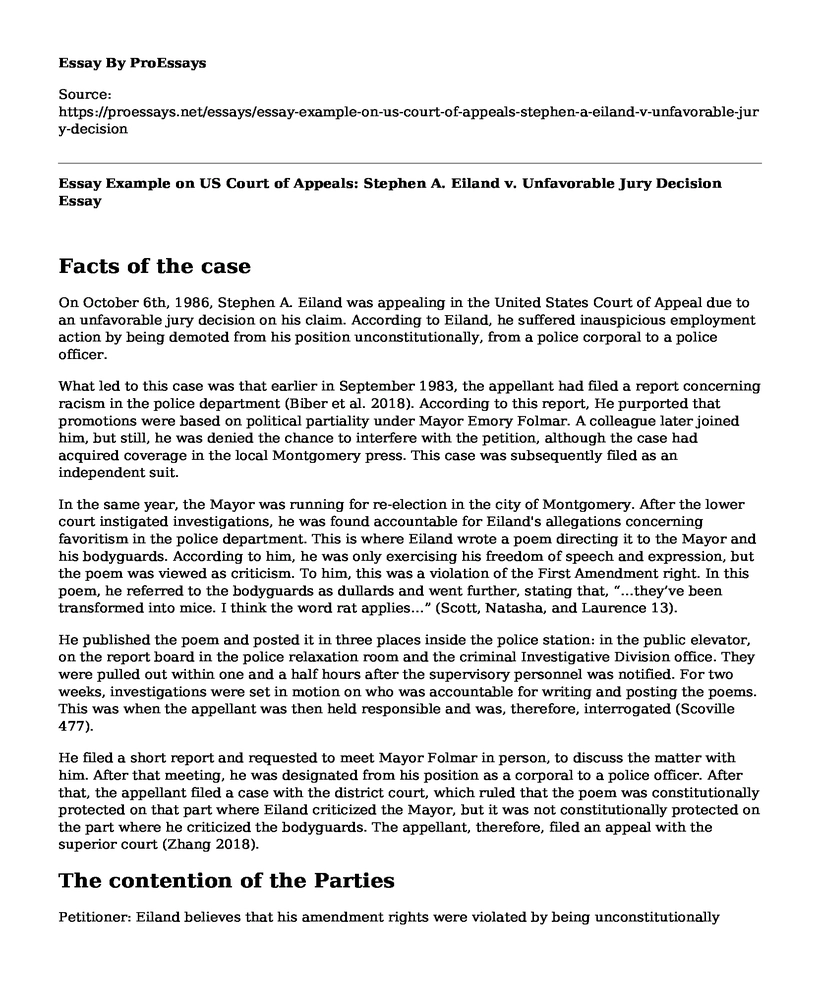Facts of the case
On October 6th, 1986, Stephen A. Eiland was appealing in the United States Court of Appeal due to an unfavorable jury decision on his claim. According to Eiland, he suffered inauspicious employment action by being demoted from his position unconstitutionally, from a police corporal to a police officer.
What led to this case was that earlier in September 1983, the appellant had filed a report concerning racism in the police department (Biber et al. 2018). According to this report, He purported that promotions were based on political partiality under Mayor Emory Folmar. A colleague later joined him, but still, he was denied the chance to interfere with the petition, although the case had acquired coverage in the local Montgomery press. This case was subsequently filed as an independent suit.
In the same year, the Mayor was running for re-election in the city of Montgomery. After the lower court instigated investigations, he was found accountable for Eiland's allegations concerning favoritism in the police department. This is where Eiland wrote a poem directing it to the Mayor and his bodyguards. According to him, he was only exercising his freedom of speech and expression, but the poem was viewed as criticism. To him, this was a violation of the First Amendment right. In this poem, he referred to the bodyguards as dullards and went further, stating that, “…they’ve been transformed into mice. I think the word rat applies…” (Scott, Natasha, and Laurence 13).
He published the poem and posted it in three places inside the police station: in the public elevator, on the report board in the police relaxation room and the criminal Investigative Division office. They were pulled out within one and a half hours after the supervisory personnel was notified. For two weeks, investigations were set in motion on who was accountable for writing and posting the poems. This was when the appellant was then held responsible and was, therefore, interrogated (Scoville 477).
He filed a short report and requested to meet Mayor Folmar in person, to discuss the matter with him. After that meeting, he was designated from his position as a corporal to a police officer. After that, the appellant filed a case with the district court, which ruled that the poem was constitutionally protected on that part where Eiland criticized the Mayor, but it was not constitutionally protected on the part where he criticized the bodyguards. The appellant, therefore, filed an appeal with the superior court (Zhang 2018).
The contention of the Parties
Petitioner: Eiland believes that his amendment rights were violated by being unconstitutionally demoted from his post.
Respondent: The state contends that even if the Eiland was exercising his freedom of expression, he went further and criticized Mayor Folmar’s bodyguards, which is not lawful and constitutionally unprotected.
Issues: If criticism is detected in someone’s speech or expression, should that be considered unlawful?
Decision: The Supreme Court held that it is considered unlawful if one criticizes the other in the name of expressing the freedom of speech either through wit or speech and should be charged accordingly.
Reasoning: If the courts allow citizens to criticize others in the name of freedom of speech, there would be a lot of unfairness and inequality since no one would follow the Constitution. The rule of law: U.S.C.A. Const.Amend.1
Works Cited
Biber, Katherine. In Crime's Archive: The Cultural Afterlife of Evidence. Taylor & Francis, 2018.
Scott, Elizabeth, Natasha Duell, and Laurence Steinberg. "Brain development, social context, and justice policy." Wash. UJL & Pol'y 57 (2018): 13.
Scoville III, George S. "Purged by Press Release: First Responders, Free Speech, and Public Employment Retaliation in the Digital Age." Or. L. Rev. 97 (2018): 477.
Zhang, Qiang. Childhood Subjectivity in Western and Chinese Thought and Literature: A Case Study of Four Masterworks. Diss. 2018.
Cite this page
Essay Example on US Court of Appeals: Stephen A. Eiland v. Unfavorable Jury Decision. (2023, Sep 03). Retrieved from https://proessays.net/essays/essay-example-on-us-court-of-appeals-stephen-a-eiland-v-unfavorable-jury-decision
If you are the original author of this essay and no longer wish to have it published on the ProEssays website, please click below to request its removal:
- Research Paper Example on Historical Fourth Amendment Cases
- The People of the State of New York v. Thomas Morrison and James Durkin
- Essay Sample on Kevin Sampson and Aimee Cipolla Case
- Essay Example on Adversarial System: Prescribed Processes for Justice
- Paper Example on Convenience Stores: Crime & Police Relationships
- Essay Sample on Missing Indigenous Women in Canada: A National Crisis
- Essay Example on Antitrust Law: Efficiency or Justice?







